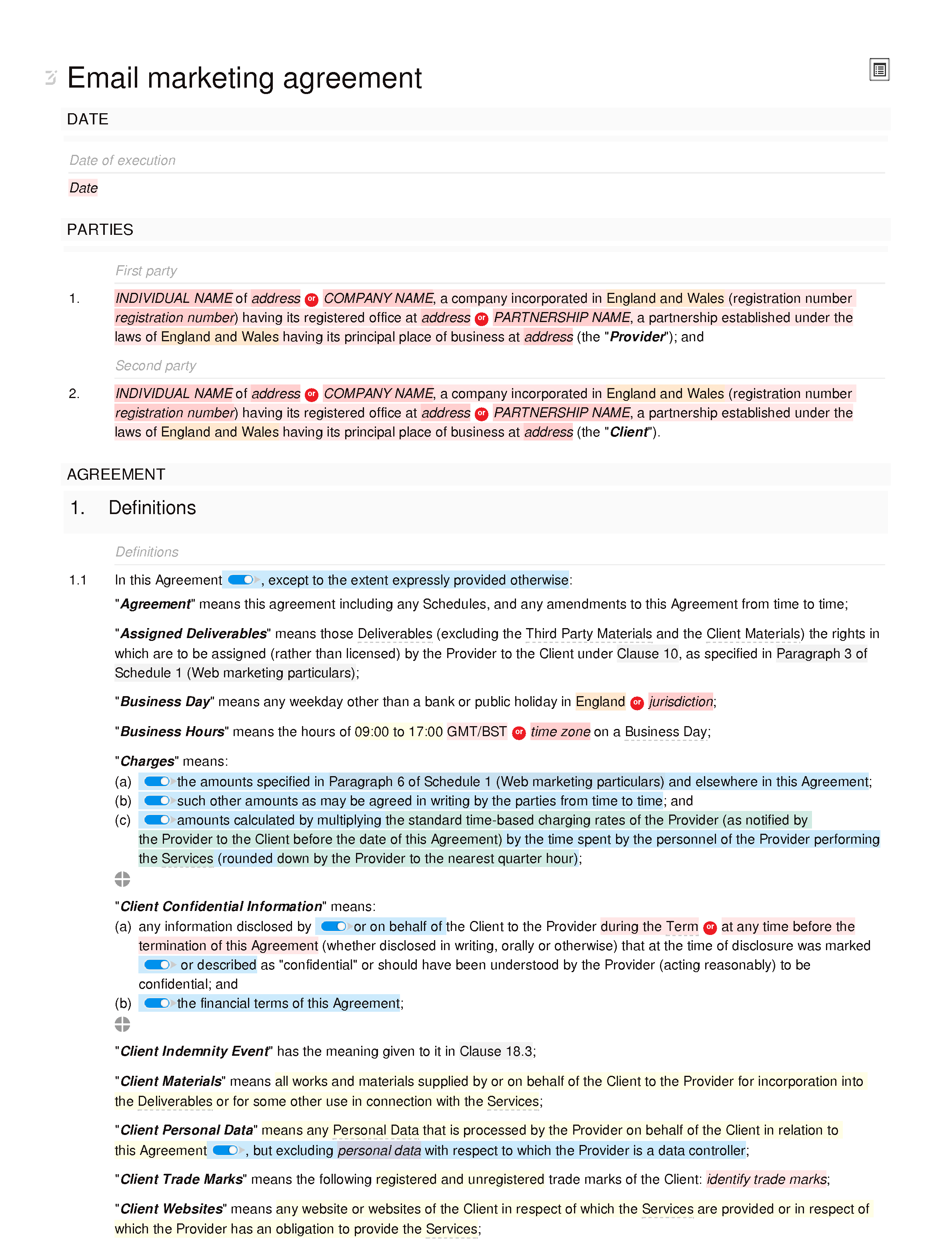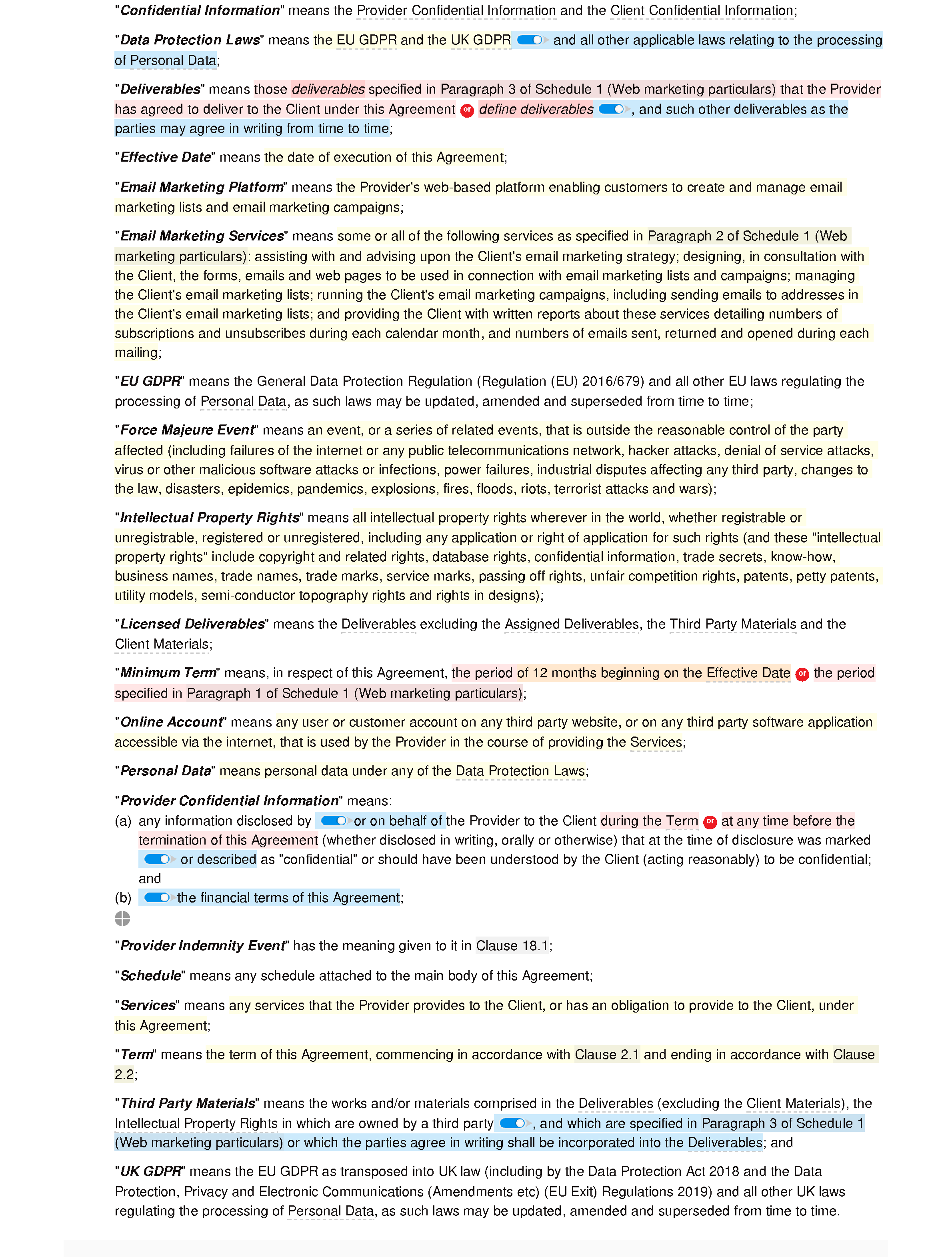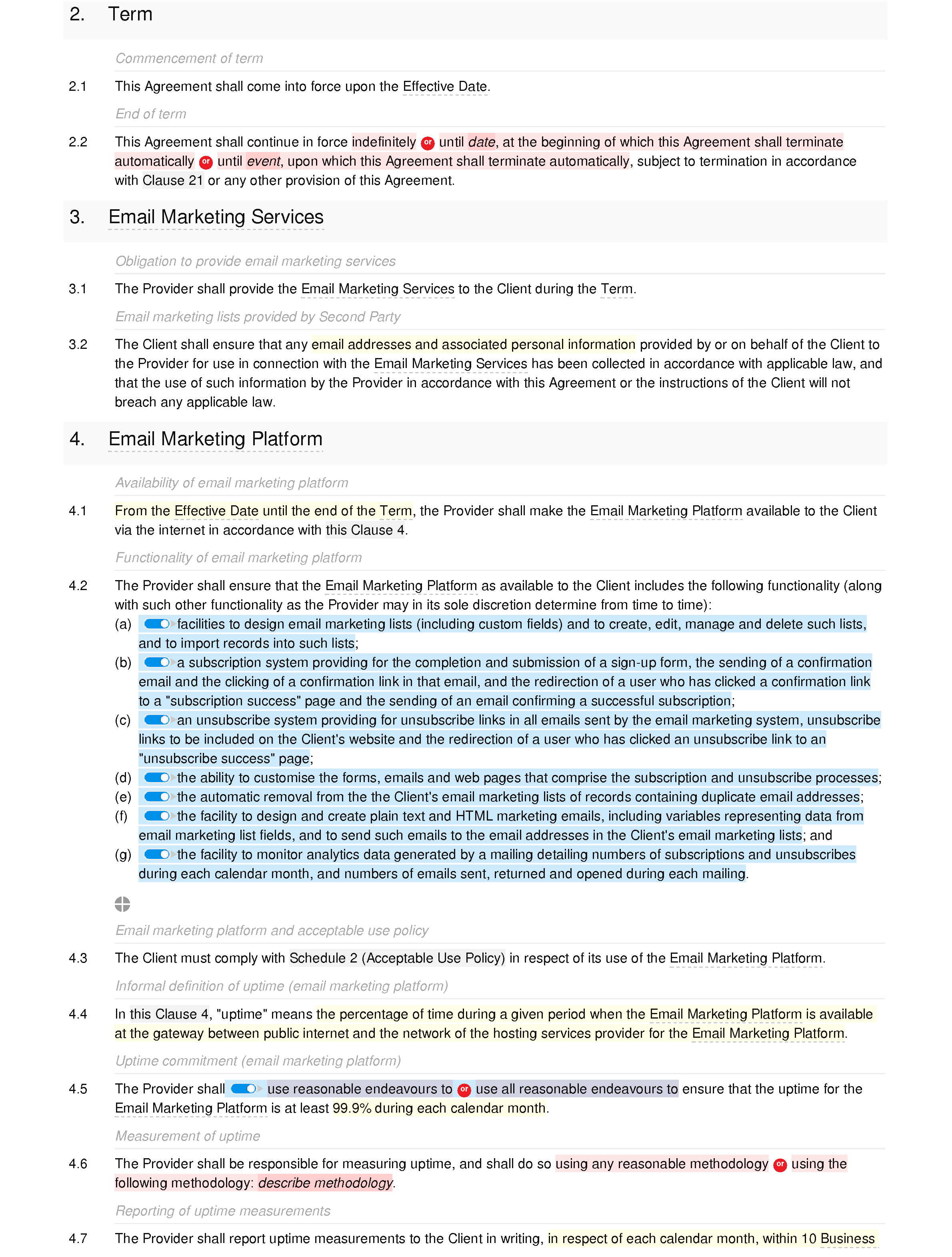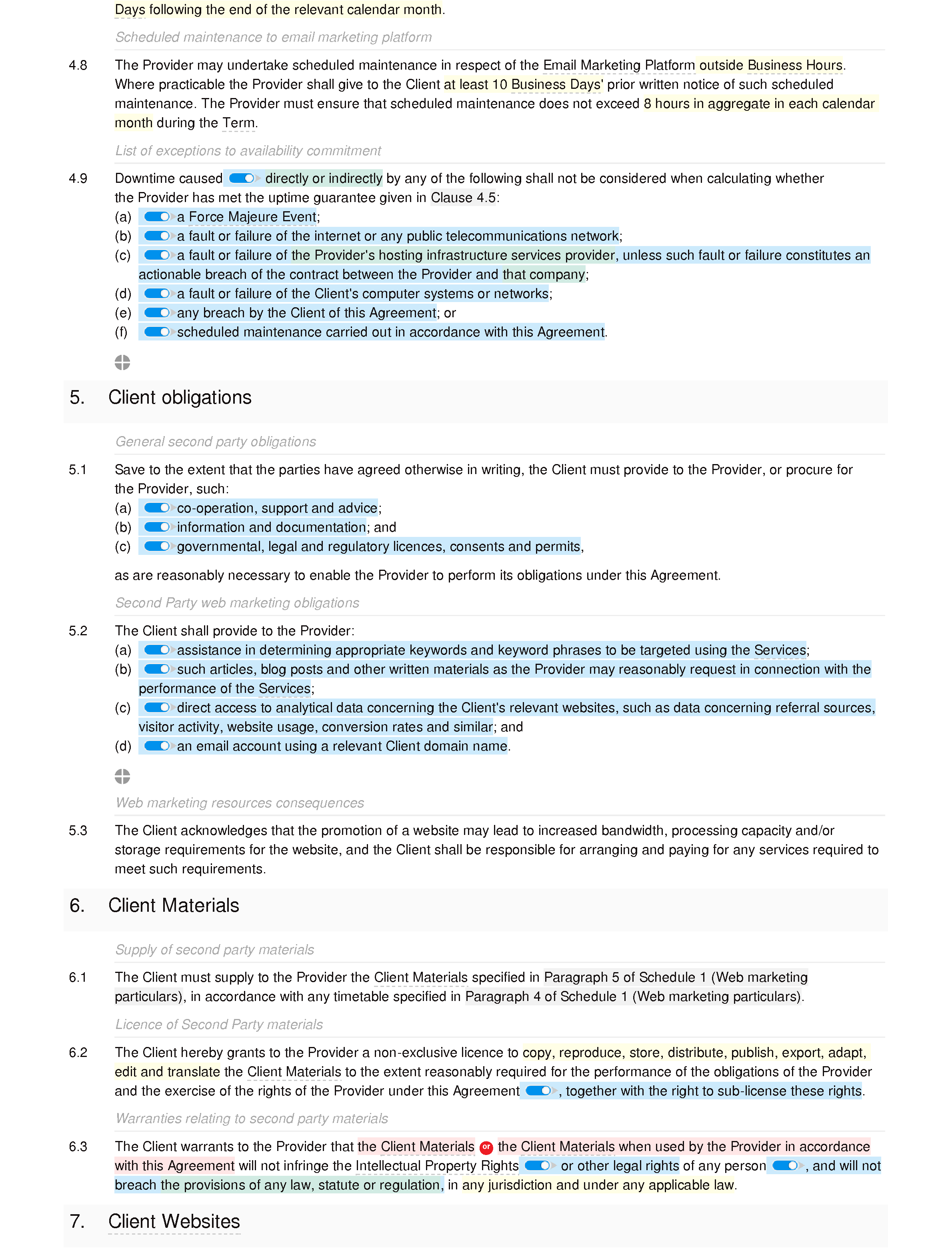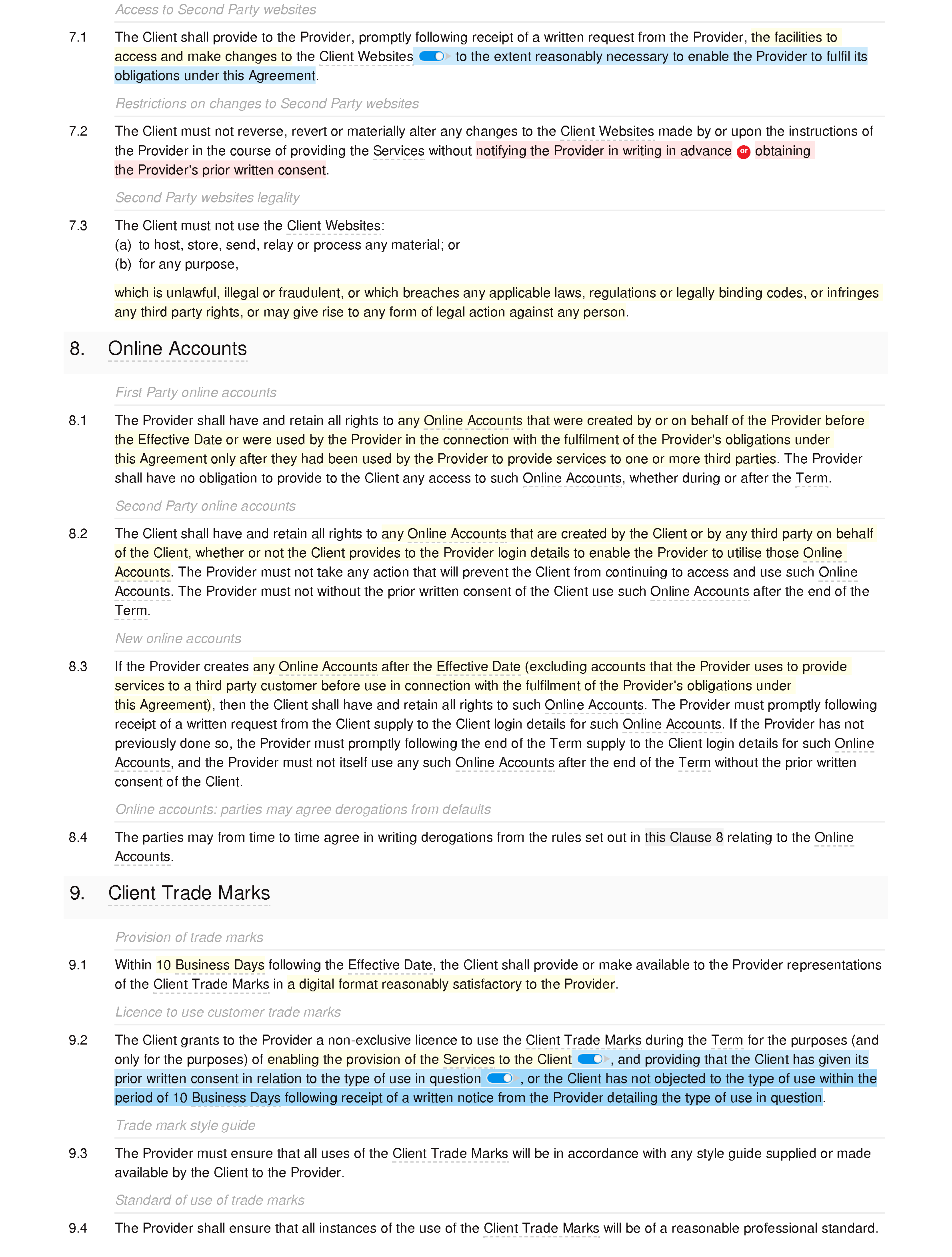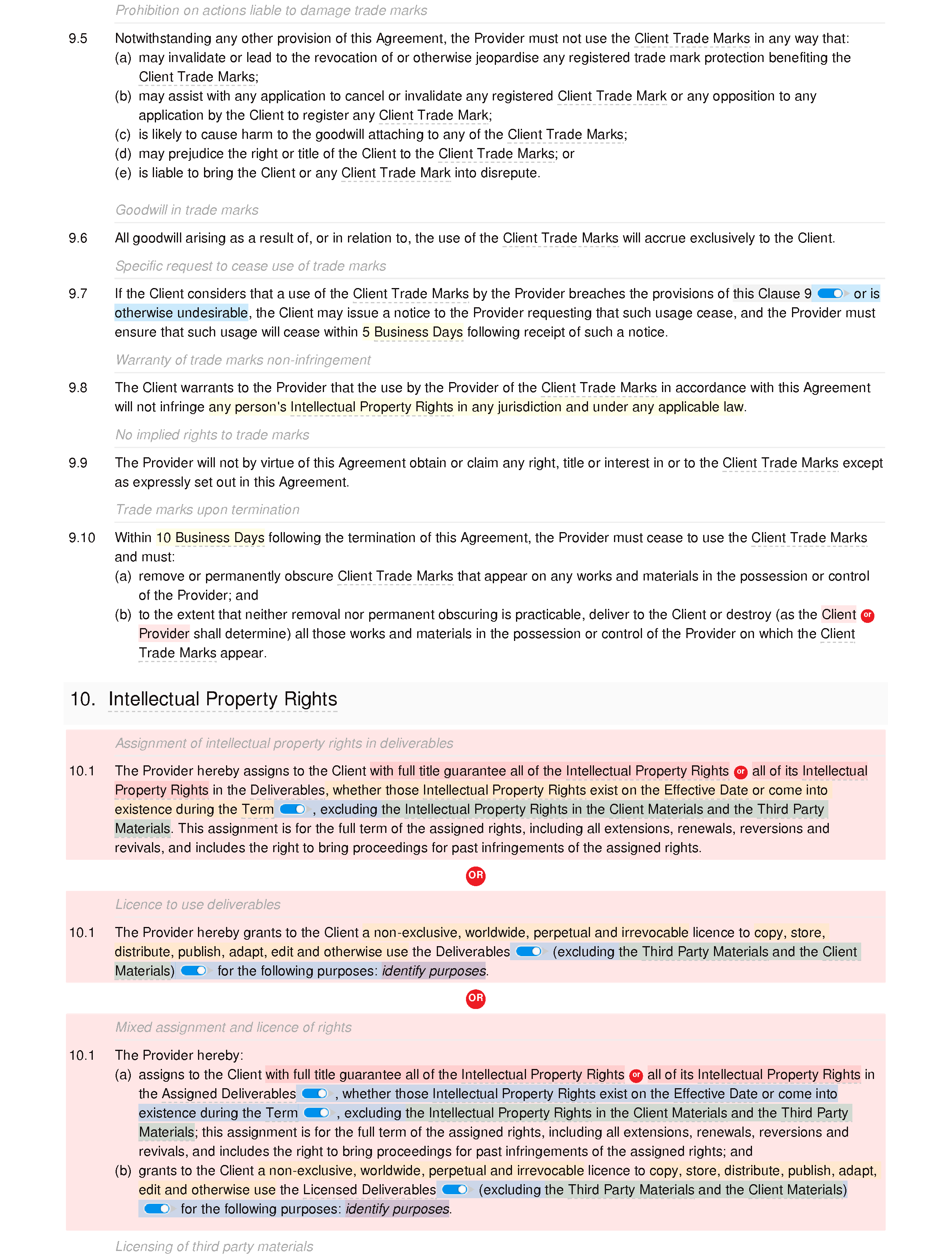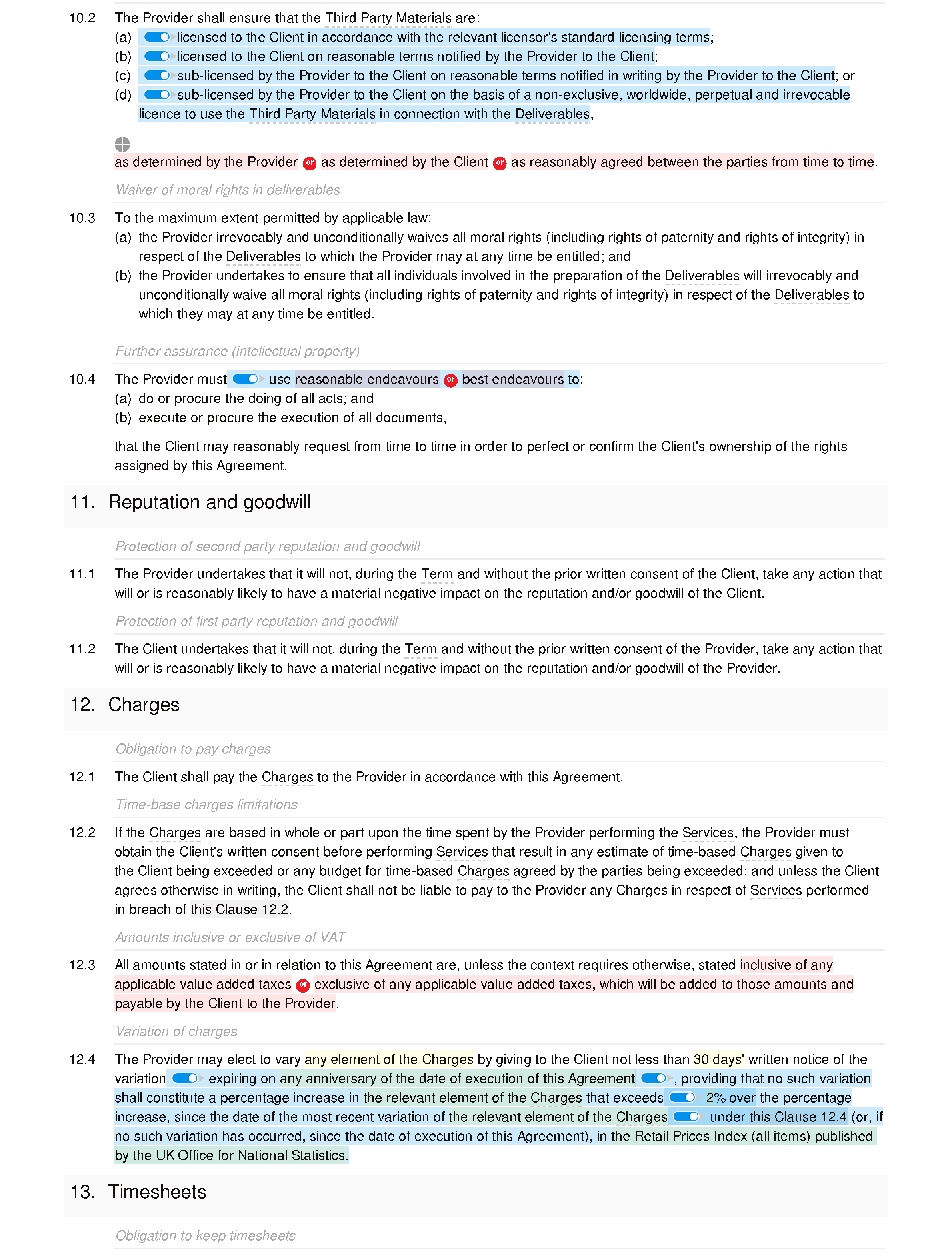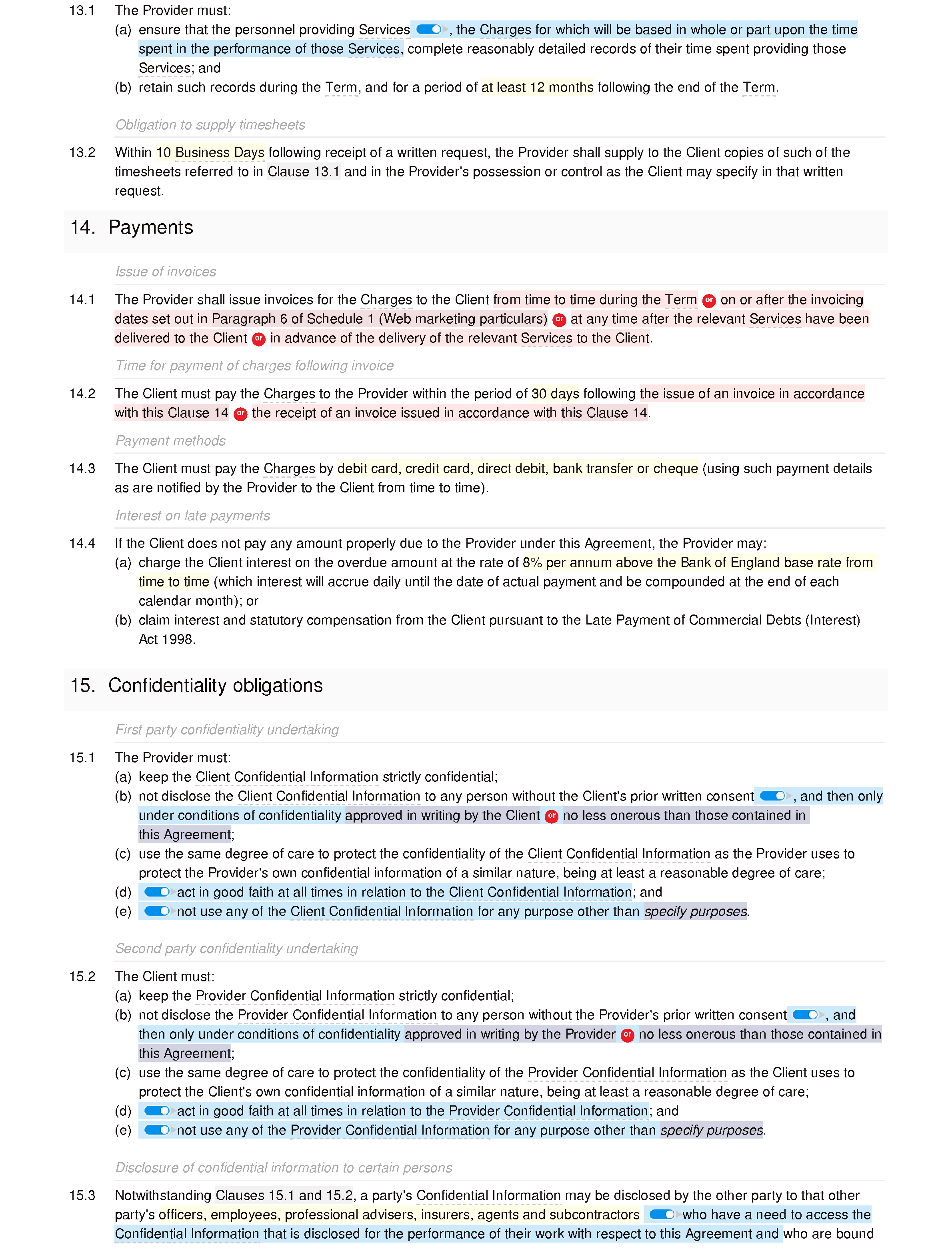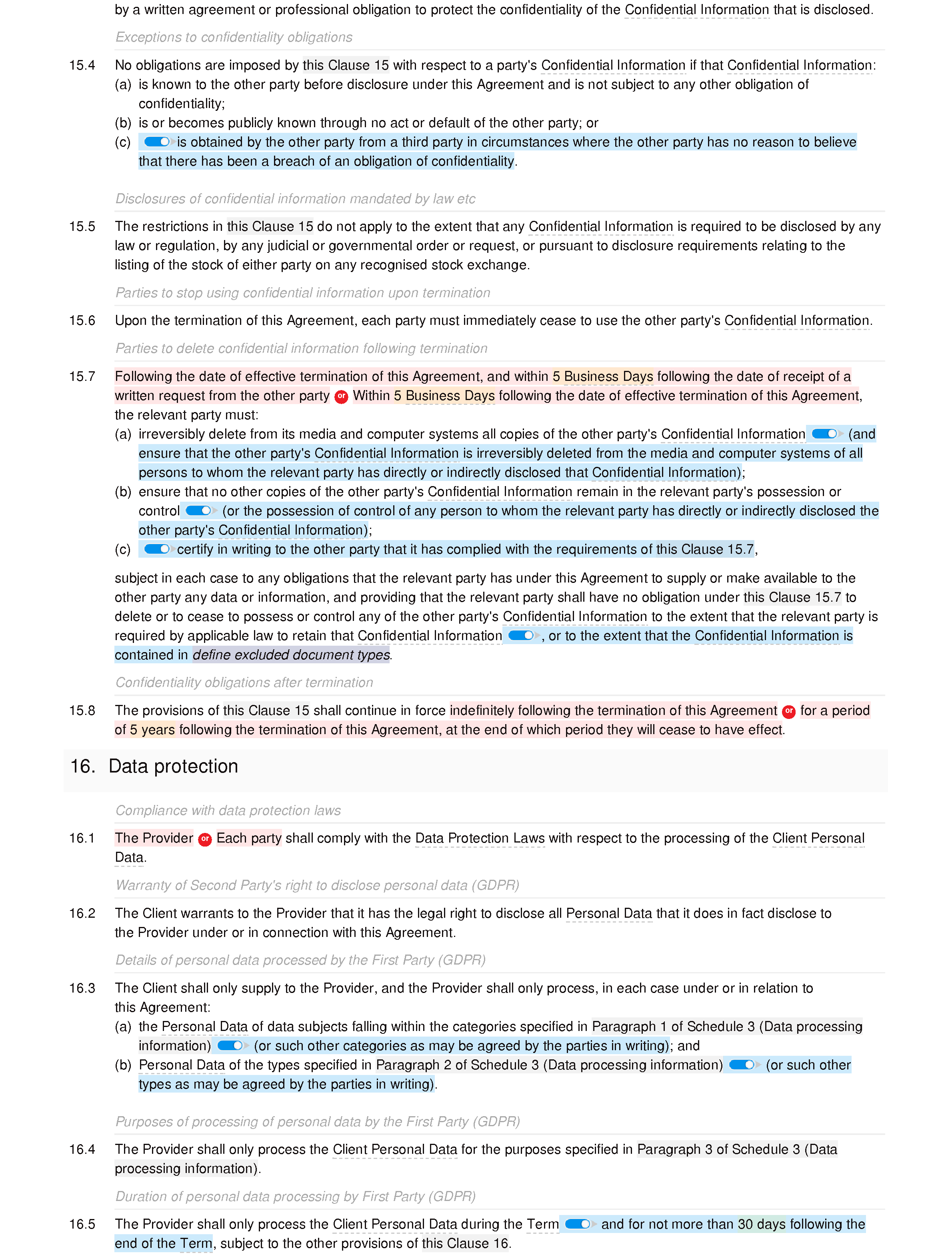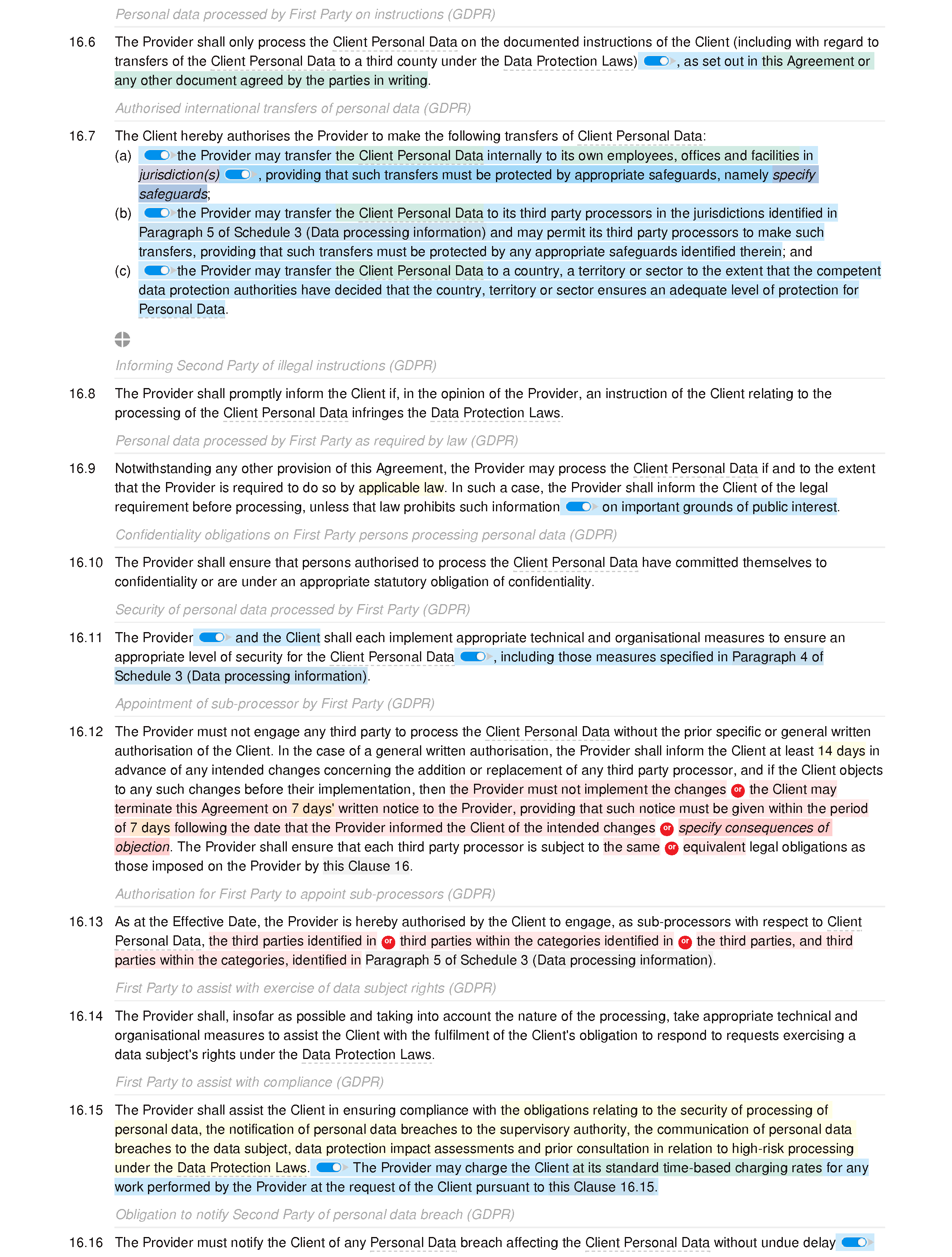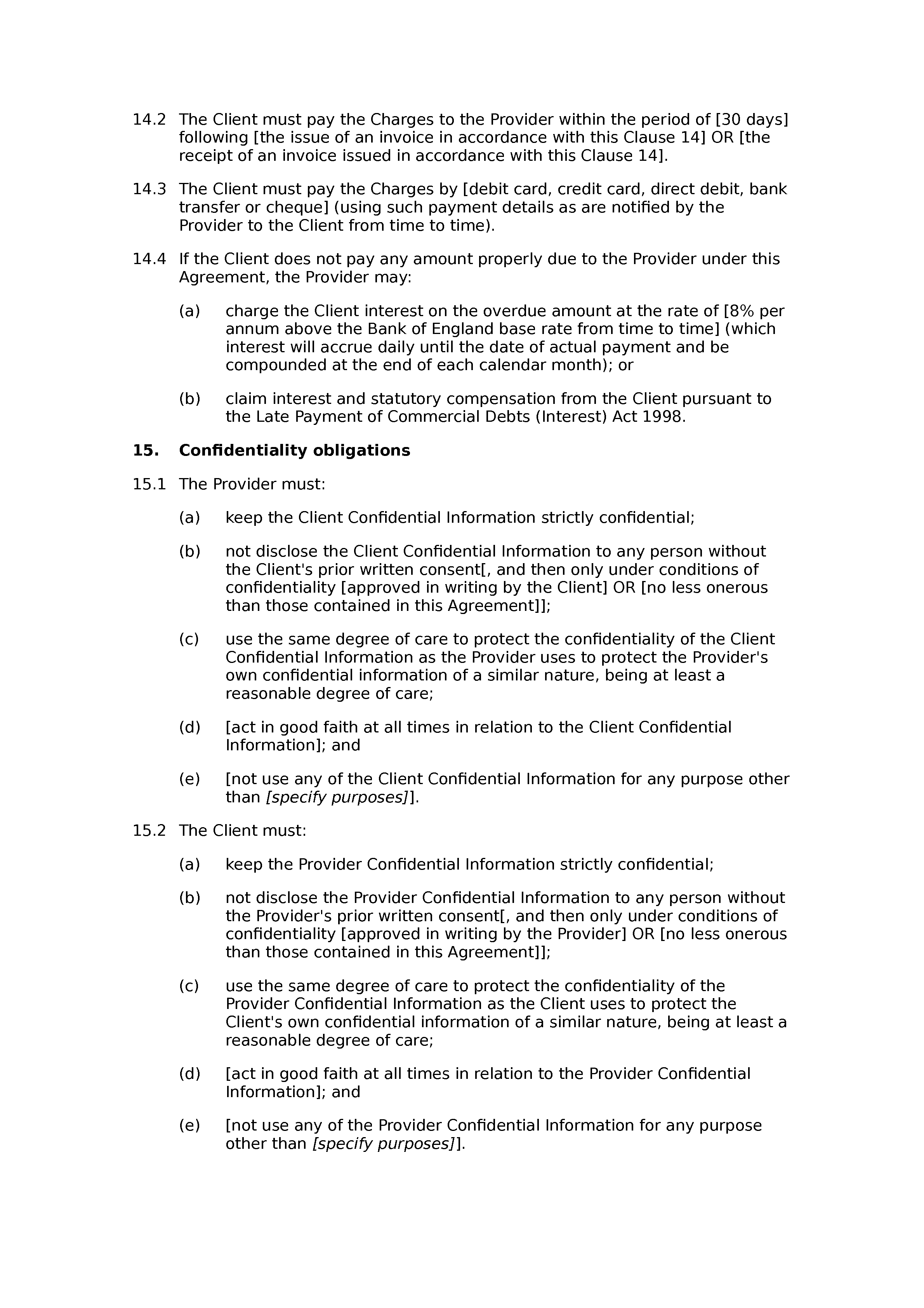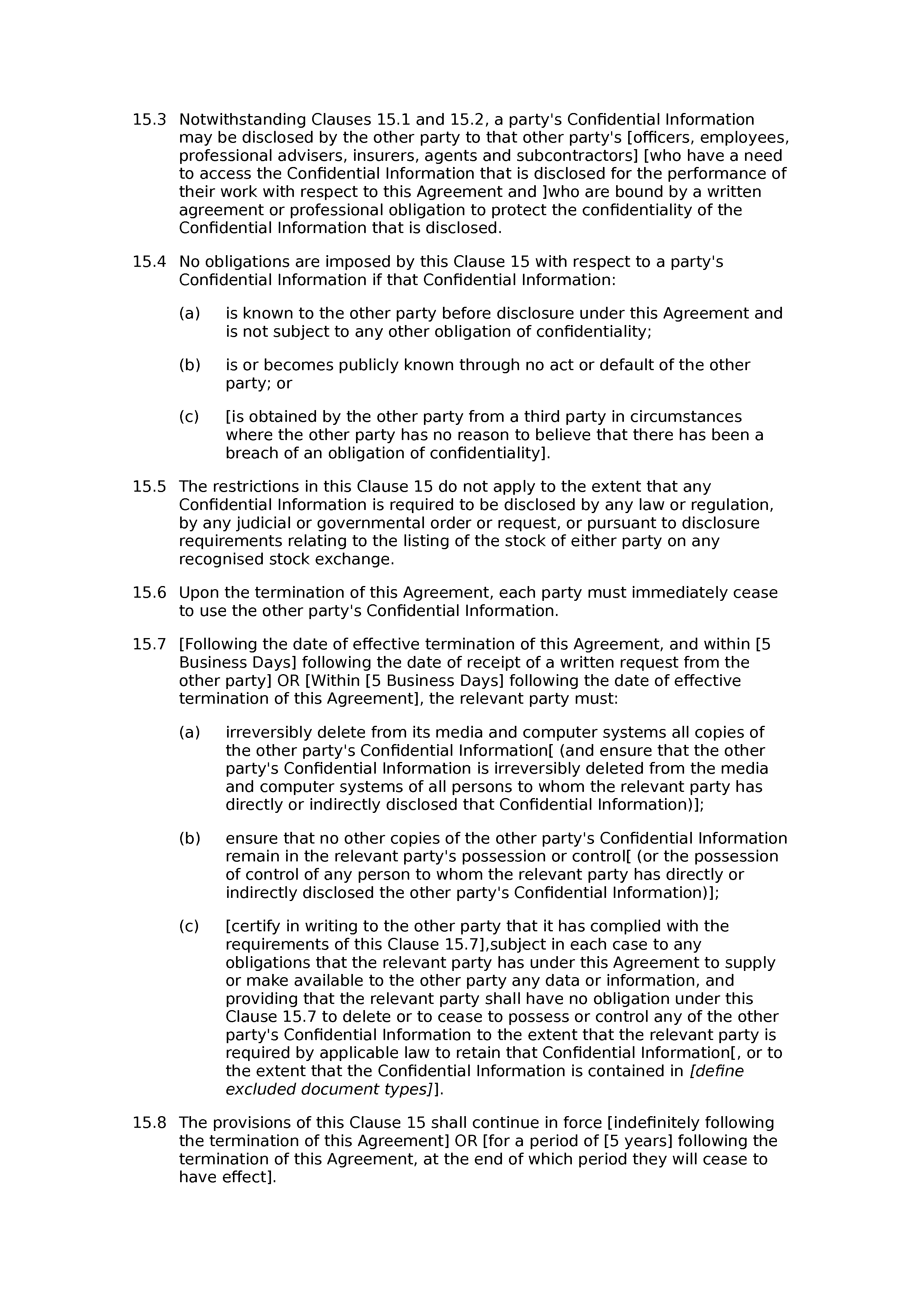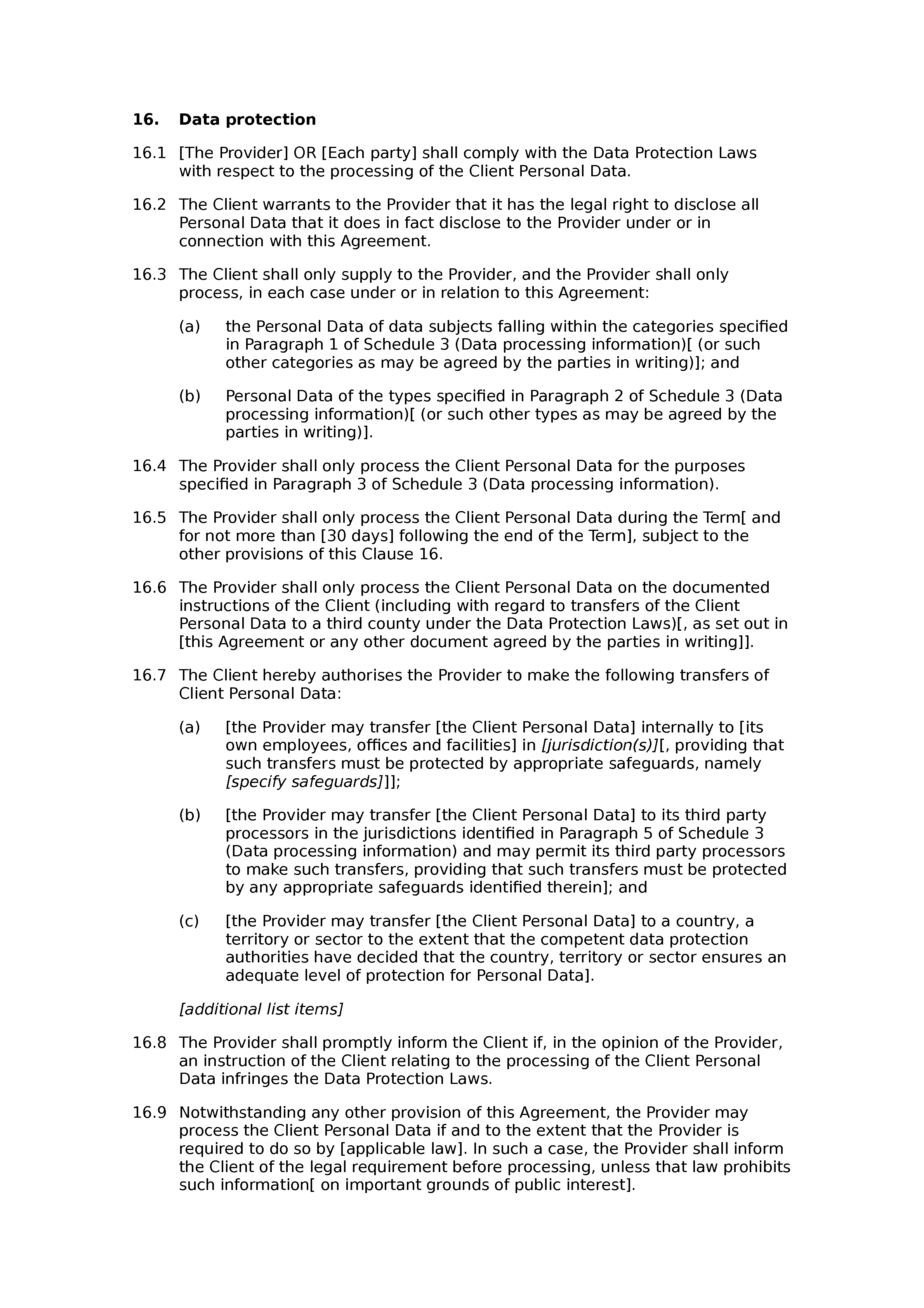Email marketing agreement
This email marketing agreement can be used in relation to three different kinds of email marketing service. First, where a service provider is actively managing a campaign for the customer. Second, where the service provider is making available a platform to allow the customer to conduct their own campaigns. Third, where both types of service are being provided.
Different legal issues affect the different types of service. For example, in relation to managed email services, the service provider will often require cooperation from the customer. In relation to platform services, the service provider will want to ensure that the customer does not misuse the platform. In relation to both types of service, the parties will want assurances that email marketing lists are being properly collected and that anti-spam laws are not being broken.
An optional acceptable use policy is attached as a schedule to this document. It may be used to regulate the use of an email marketing platform by the customer.
This document is very similar to our email marketing terms and conditions document, although in a slightly different form.
If you are looking for a document that covers other types of online marketing services, see our web marketing services agreement.
Email marketing agreement contents
- Definitions: definitions.
- Term: commencement of term; end of term.
Email Marketing Services : obligation to provide email marketing services; email marketing lists provided byClient.Email Marketing Platform : availability of email marketing platform ; functionality of email marketing platform; email marketing platform and acceptable use policy; informal definition of uptime (email marketing platform); uptime commitment (email marketing platform); measurement of uptime; reporting of uptime measurements; scheduled maintenance to email marketing platform; list of exceptions to availability commitment.- Clientobligations: general second party obligations;Clientweb marketing obligations; web marketing resources consequences.
- ClientMaterials: supply of second party materials; licence ofClientmaterials; warranties relating to second party materials.
Online Accounts :Provideronline accounts;Clientonline accounts; new online accounts; online accounts: parties may agree derogations from defaults.Intellectual Property Rights : assignment of intellectual property rights in deliverables; licence to use deliverables; mixed assignment and licence of rights; licensing of third party materials; waiver of moral rights in deliverables; further assurance (intellectual property).- Reputation and goodwill: protection of second party reputation and goodwill; protection of first party reputation and goodwill.
- Charges: obligation to pay charges; time-base charges limitations; amounts inclusive or exclusive of VAT; variation of charges.
- Timesheets: obligation to keep timesheets; obligation to supply timesheets.
- Payments: issue of invoices; time for payment of charges following invoice; payment methods; interest on late payments.
- Confidentiality obligations: first party confidentiality undertaking; second party confidentiality undertaking; disclosure of confidential information to certain persons; exceptions to confidentiality obligations; disclosures of confidential information mandated by law etc; parties to stop using confidential information upon termination; parties to delete confidential information following termination; confidentiality obligations after termination.
- Data protection: compliance with data protection laws; warranty of Client's right to disclose personal data (GDPR); details of personal data processed bythe Provider(GDPR); purposes of processing of personal data bythe Provider(GDPR); duration of personal data processing byProvider(GDPR); personal data processed byProvideron instructions (GDPR); authorised international transfers of personal data (GDPR); informingClientof illegal instructions (GDPR); personal data processed byProvideras required by law (GDPR); confidentiality obligations onProviderpersons processing personal data (GDPR); security of personal data processed byProvider(GDPR); appointment of sub-processor byProvider(GDPR); authorisation forProviderto appoint sub-processors (GDPR);Providerto assist with exercise of data subject rights (GDPR);Providerto assist with compliance (GDPR); obligation to notifyClientof personal data breach (GDPR);Providerto provide data protection compliance information (GDPR); deletion of personal data byProvider(GDPR);Providerto allow audit (GDPR); changes to data protection law.
- Warranties: standard of services; first party general warranties; second party warranty of authority; exclusion of implied warranties and representations.
- Indemnities: indemnity upon breach: any provision or specified provisions (with definition); conditions upon first party indemnity; indemnity upon breach: any provision or specified provisions (with definition); conditions upon second party indemnity; limitations of liability vs indemnities.
- Limitations and exclusions of liability: caveats to limits of liability; interpretation of limits of liability; no liability for force majeure; no liability for loss of profits; no liability for loss of revenue; no liability for loss of use; no liability for loss of opportunities; no liability for loss of data or software; no liability for consequential loss; per event liability cap upon services contract; aggregate liability cap upon services contract.
Force Majeure Event : obligations suspended for force majeure; force majeure notification and information; mitigation of effects of force majeure.- Termination: termination without cause (optionally asymmetric); termination by either party without cause; termination upon breach; termination upon insolvency; termination upon non-payment.
- Effects of termination: surviving provisions upon termination; termination does not affect accrued rights; Clientdatasets upon termination.
- Status of Provider: first party is independent contractor not employee; no redundancy or compensation.
- Notices: methods and deemed receipt of contractual notices; contact details for contractual notices; substitute contact details for notices.
- Subcontracting: no subcontracting without consent; subcontracting permitted; first party responsible for subcontracted obligations.
- General: no waiver; severability; variation written and signed; no assignment without written consent; no third party rights; entire agreement; governing law; exclusive jurisdiction.
- Interpretation: statutory references; section headings not affecting interpretation; calendar month meaning; no ejusdem generis.
SCHEDULE 1 (WEB MARKETING PARTICULARS)
Minimum Term : minimum term prompt.- Specification of
Services : specification of services prompt. - Specification of
Deliverables : specification of deliverables prompt. - Timetable: timetable prompt.
- Financial provisions: financial provisions prompt.
SCHEDULE 2 (ACCEPTABLE USE POLICY)
- Introduction: definitions for acceptable use policy; parties to policy; agreement to policy by using services; express agreement to policy; services user minimum age under policy.
- General usage rules: no damaging use of services; no unlawful use of services; content must comply with provisions of part.
- Unlawful
Content : no unlawful user content: general prohibition; no unlawful user content: specific prohibitions; previous complaints and user content. - Graphic material: age suitability of user content; no violence in user content; no pornographic user content.
- Factual accuracy: content must be truthful; content must not risk defamation.
- Negligent advice: no professional advice in user content; no negligent advice in user content.
- Etiquette: content appropriate etc; no offensive content; no annoying content; no hostile communications; no deliberate offense; no content flooding; no duplicate content; categorisation of content; appropriate content titles; courtesy to service users.
- Marketing and spam: prohibition on marketing activities; no spam in user content; sending spam using email addresses; no promotion of marketing schemes; avoidance of IP blacklisting.
- Regulated businesses: no gambling-related activities; no pharmaceutical activities; no weapon-related activities.
- Monitoring: acknowledgement relating to monitoring.
- Data mining: no data mining.
- Hyperlinks: no hyperlinks to prohibited content.
- Harmful software: no harmful software; no risky software.
SCHEDULE 3 (DATA PROCESSING INFORMATION)
- Categories of data subject: prompt for categories of data subject.
- Types of
Personal Data : prompt for types of personal data. - Purposes of processing: prompt for personal data processing purposes.
- Security measures for
Personal Data : prompt for security measures for personal data. - Sub-processors of Personal Data: prompt for identifying sub-processors of personal data.
